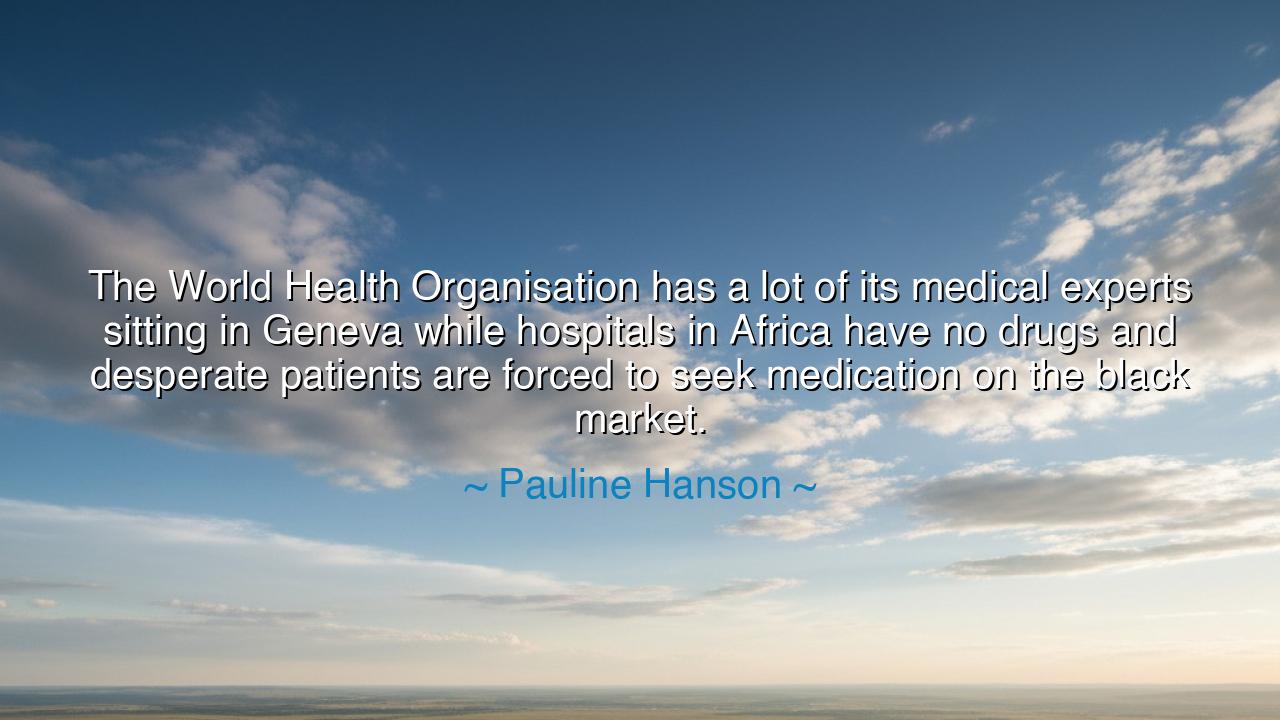
The World Health Organisation has a lot of its medical experts
The World Health Organisation has a lot of its medical experts sitting in Geneva while hospitals in Africa have no drugs and desperate patients are forced to seek medication on the black market.






“The World Health Organisation has a lot of its medical experts sitting in Geneva while hospitals in Africa have no drugs and desperate patients are forced to seek medication on the black market.” So spoke Pauline Hanson, casting a fiery light upon the deep shadow that divides the powerful halls of decision from the humble huts of suffering. In this statement lies not merely a criticism, but a cry—a call to awaken the conscience of humanity to the gulf that has grown between authority and action, between privilege and need, between the councils of the comfortable and the cries of the dying. It is a reminder that compassion without presence is hollow, and knowledge without service is vain.
In these words, Hanson does not merely accuse an institution; she unveils a truth universal and timeless: that those who hold power must remember the purpose for which that power was given. The World Health Organisation, with its armies of experts and libraries of data, sits far from the dust of the sickroom, where fevered children lie on dirt floors and mothers wait in silence for medicine that will not come. Her lament is that wisdom has withdrawn into ivory towers while human suffering cries unheard in the streets. It is a challenge to every generation—to bridge the distance between those who study pain and those who endure it.
For what is the use of expertise, if it does not heal the broken? What is the worth of knowledge, if it does not flow to the places where it is most needed? The ancient philosophers spoke of justice as balance—the harmony between intention and deed. Yet here, Hanson points to a disharmony of the gravest kind. The learned sit in comfort, debating strategies and funding, while across continents, hospitals fall silent for want of medicine. It is not that wisdom dwells in error, but that wisdom has become too still—content to observe, unwilling to act. True service demands movement—to leave the marble halls, to walk among the suffering, and to bring not words, but relief.
Let us remember the tale of Dr. Albert Schweitzer, the philosopher who left behind his comfortable life in Europe to serve as a physician in the jungles of Africa. He had read of the suffering there and could have chosen to write essays or deliver speeches from afar, as so many did. But Schweitzer understood that compassion without presence is powerless. He built a hospital in Lambaréné, in the heart of the equatorial forest, and there he healed the sick with his own hands. His courage and humility breathed life into his wisdom. He proved that true leadership in medicine—and in all human endeavors—demands not only intellect, but proximity to pain.
Hanson’s words, though born in modern times, carry the spirit of this same ancient truth: that one cannot heal the world from afar. To sit in Geneva while the poor perish is not evil in itself, but it is blindness—the blindness of bureaucracy, of distance, of self-congratulation. Those who wish to serve humanity must first see humanity, not in reports or meetings, but in the eyes of those who suffer. The world’s healers, if they are to earn their name, must go where the wounds are open, and there bind them with both skill and compassion.
Yet her words also hold a warning—not only for institutions, but for us all. For each of us holds some measure of comfort, some distance from another’s suffering. How often do we, too, sit in our own “Geneva,” speaking of justice, kindness, or hope, while those in need wait just beyond our reach? The black market for medicine, that desperate mirror of failure, exists not only in Africa—it exists wherever despair meets neglect, wherever human systems forget their human purpose. It is a wound not of the body, but of the soul of civilization.
So, my children, take this lesson to heart: wisdom must walk, and compassion must act. Do not let your concern remain in the safety of speech. When you see suffering, go to it; when you see injustice, rise against it. Let your knowledge serve the living, not your comfort serve the self. For every idle expert who remains behind walls, there is a single brave soul who steps into the world and changes it. Be that soul. Let your courage fill the void left by indifference, and your deeds restore the balance that words alone cannot.
For in the end, the health of the world depends not on how many sit in Geneva, but on how many stand among the suffering, bearing light in their hands.






AAdministratorAdministrator
Welcome, honored guests. Please leave a comment, we will respond soon